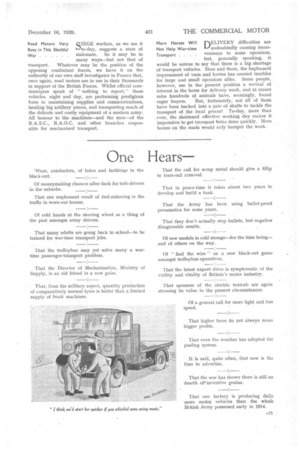One Hears
Page 23

If you've noticed an error in this article please click here to report it so we can fix it.
'Ware, conductors, of fakes and farthings in the black-out.
Of moneymaking chances after dark for taid-drivers in the suburbs.
That one unpleasant result of fuel-rationing is the traffic in worn-out horses.
Of cold hands at the steering wheel as a thing of the past amongst army drivers.
That many adults are going back th school—to be trained for war-time transport jobs.
That the trolleybus may yet solve many a wartime passenger-transport problem.
That the Director of Mechanization, Ministry of Supply, is an old friend in a new guise.
That, from the military aspect, quantity production of comparatively normal tyres is better than a limited supply of freak machines. That the call for scrap metal should give a fillip to tram-rail removal.
That in peace-time it takes about two years to develop and build a -tank.
That the Army has been using bullet-proof pneumatics for some years.
That they don't actually stop bullets, but negative disagreeable results.
Of new models in cold storage—for the time being— and of others on the way.
Of "find the wire" as a new black-out game amongst trolleybus operatives.
That the latest export drive is symptomatic of the virility and vitality of Britain's motor industry.
That sponsors of the electric taxicab are again stressing its value in the present circumstances.
Of a general call for more light and less speed.
That higher fares do not always mean bigger profits.
That even the weather has adopted the pooling system.
It is said, quite often, that now is the time to advertise.
That the war has shown there is still no dearth of•inventive genius.
That one factory is producing daily more motor vehicles than the whole British Army possessed early in 1914.




































































